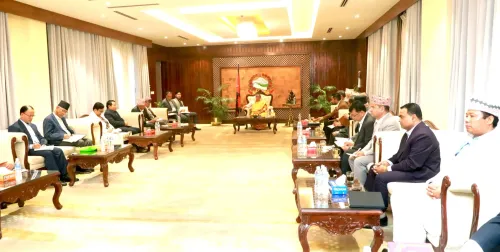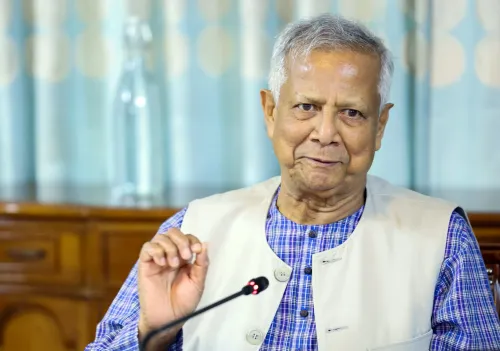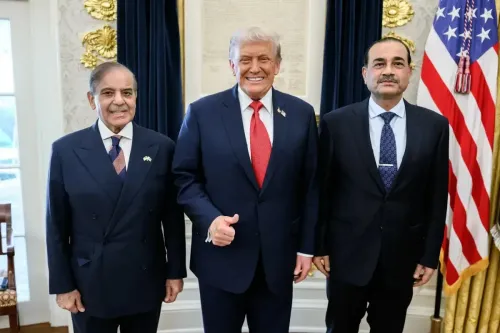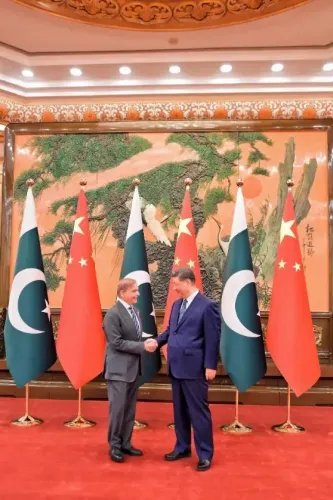Is the Trump Administration Taking a 'Prudent' and 'Strategic' Approach to North Korea?
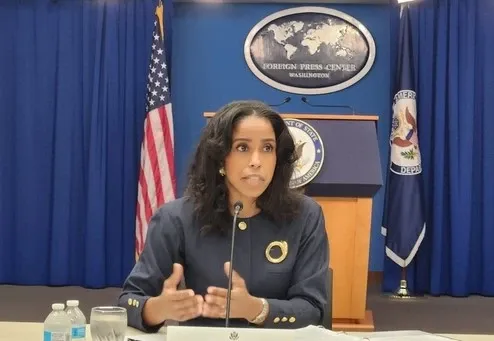
Synopsis
Key Takeaways
- The US is committed to North Korea's complete denuclearization.
- Trilateral cooperation among the US, South Korea, and Japan is crucial for regional security.
- Trade negotiations are ongoing with South Korea and Japan amidst tariff discussions.
- Efforts are being made to reduce military tensions on the Korean Peninsula.
- South Korea is considered a key player in promoting peace in the Indo-Pacific.
Washington, July 12 (NationPress) The administration of US President Donald Trump is adopting a "prudent" and "strategic" methodology in tackling the challenges posed by North Korea, according to a US diplomat who reaffirmed the commitment to the "complete denuclearization" of North Korea.
During a press conference, State Department Deputy Spokesperson Mignon Houston emphasized the importance of the trilateral alliance between South Korea, the United States, and Japan, describing it as a "substantial" partnership that promotes a "free and open" Indo-Pacific. She also acknowledged the efforts by Seoul and Tokyo to move past historical grievances and enhance collaboration.
Houston stated, "The United States has always been committed to the complete denuclearization of North Korea. This commitment is crucial for ensuring regional stability." This was articulated during a press meeting at the Foreign Press Centre in Washington.
She added, "We are collaborating on various fronts with our partners and allies to reduce military tensions and safeguard the security of the Korean Peninsula."
Houston further noted that the Trump administration is working alongside allies to guarantee "transparent" defense strategies, "efficient and effective" military collaboration, and necessary risk management for security on the peninsula, as reported by Yonhap news agency.
She remarked, "These measures are prudent and strategic steps aimed at ensuring a secure Korean Peninsula."
Responding to inquiries about the Trump administration's characterization of its North Korean strategy, she contrasted it with the approach of former President Joe Biden, which was labeled as "calibrated" and "practical".
Houston reaffirmed the US's dedication to fostering steady three-way cooperation among South Korea, the US, and Japan, which has strengthened as ties between Seoul and Tokyo improve after a period of historical and territorial tensions.
She stated, "The relationship between Japan and South Korea is currently stronger than ever, and we recognize the painful histories both nations have faced. Our focus remains on collaborative efforts to address common opportunities and challenges."
Houston underscored the trilateral partnership as "integral" for promoting regional peace.
Describing South Korea as the "linchpin of peace, security, and safety in the Indo-Pacific," she highlighted the US administration's "modernized and future-oriented" strategy for the Seoul-Washington relationship.
She elaborated, "South Korea enjoys a vast trading relationship with the US, supporting at least 350,000 American jobs, and is based on high-value products. We appreciate their leadership in the 2025 APEC." APEC stands for Asia-Pacific Economic Cooperation.
Addressing concerns about tensions with allies regarding Trump's tariff policies, Houston defended them as "strategic" moves toward establishing fair trade relations.
She explained, "This is not a punitive measure but a strategic step to collaborate with our allies and partners globally, ensuring that trade arrangements reflect fairness... We believe that through collaborative efforts, we can achieve these goals."
South Korea, Japan, and other nations have engaged in trade negotiations with the US, as Trump's "reciprocal" tariffs, which include 25 percent duties on Korea, are slated to take effect on August 1.
While the steep tariffs were initiated on April 9, Trump allowed a 90-day pause for negotiations, which was originally set to end this week but has now been extended until August 1.
Houston concluded, "We are eager to work closely with our global partners and allies to balance these trade disparities to create a level playing field. This remains a priority for us at this time."
In response to a query regarding the potential extension of the Quad forum to include new members like South Korea, Houston mentioned that while there might not be room for new members, opportunities for collaboration with Korea within the existing group—comprised of the US, Australia, Japan, and India—could arise.
She stated, "There are numerous work streams where we can collaborate closely with South Korea regarding our shared interests and priorities for the region."

